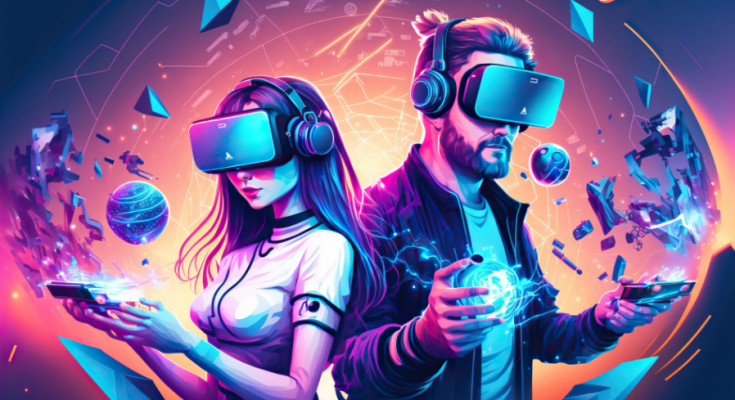The Metaverse: Exploring the Future of Virtual Worlds and Digital Interaction
In recent years, the concept of the metaverse has captured the imagination of technologists, futurists, and enthusiasts alike, promising a future where virtual worlds converge with physical reality to create immersive and interconnected digital experiences. While the metaverse remains largely speculative, recent advancements in virtual reality (VR), augmented reality (AR), artificial intelligence (AI), and blockchain technology have brought us closer to realizing this vision. In this article, we’ll explore the concept of the metaverse, its potential applications, and the implications for society, culture, and technology.
Understanding the Metaverse:
The term “metaverse” was coined by science fiction author Neal Stephenson in his 1992 novel “Snow Crash,” where it referred to a virtual reality-based successor to the internet. Since then, the concept has evolved to encompass a collective virtual space where users can interact with each other and digital content in real-time, regardless of physical location or device. The metaverse is envisioned as a persistent, immersive, and interconnected digital universe that blurs the boundaries between the physical and virtual worlds.
Key Components of the Metaverse:
While there is no single definition of the metaverse, it is generally characterized by several key components:
- Virtual Worlds: The metaverse consists of interconnected virtual worlds or environments, each with its own rules, physics, and social dynamics. These virtual worlds can range from immersive 3D environments to augmented reality overlays on the physical world.
- Avatar-based Interaction: Users navigate and interact with the metaverse through digital avatars, representing themselves in virtual space. Avatars can be customized to reflect users’ identities, preferences, and personalities, allowing for self-expression and social interaction.
- Real-time Communication: Communication and collaboration in the metaverse occur in real-time, enabling synchronous interaction between users across different locations and devices. Voice chat, text chat, and other communication tools facilitate social interaction and collaboration within virtual environments.
- User-generated Content: The metaverse encourages user-generated content creation, allowing users to build, customize, and share digital assets, environments, and experiences. User-generated content fuels creativity, diversity, and innovation within the metaverse ecosystem.
- Economic and Social Systems: The metaverse supports economic and social systems that enable commerce, trade, and social interaction among users. Virtual currencies, digital assets, and decentralized governance models underpin economic and social interactions within the metaverse.
Applications of the Metaverse:
The potential applications of the metaverse are vast and diverse, spanning various industries and domains:
- Gaming and Entertainment: The gaming industry is poised to be a major driver of the metaverse, with virtual worlds, multiplayer games, and interactive experiences offering immersive entertainment experiences for players. Virtual concerts, events, and social experiences are also becoming increasingly popular within the metaverse.
- Education and Training: The metaverse has the potential to revolutionize education and training by providing immersive, interactive learning environments that engage students and facilitate experiential learning. Virtual classrooms, simulations, and training programs offer new opportunities for remote education and professional development.
- Work and Collaboration: Remote work and collaboration tools are evolving to incorporate metaverse technologies, enabling distributed teams to collaborate, communicate, and co-create in virtual environments. Virtual offices, meeting spaces, and productivity tools support remote work and enhance collaboration among employees.
- Commerce and Retail: E-commerce and retail are being transformed by the metaverse, with virtual storefronts, digital marketplaces, and immersive shopping experiences offering new opportunities for merchants and consumers. Virtual try-on, customization, and personalization tools enhance the online shopping experience and drive engagement.
- Social Interaction and Community Building: The metaverse facilitates social interaction and community building through virtual gatherings, events, and social networks. Virtual communities, clubs, and social spaces provide opportunities for like-minded individuals to connect, share interests, and build relationships.
Challenges and Considerations:
While the metaverse holds immense promise, it also raises significant challenges and considerations:
- Privacy and Security: The metaverse raises concerns about privacy, data security, and digital identity management, as users interact and share personal information within virtual environments. Robust privacy protections and security measures are needed to safeguard users’ data and ensure trust and confidence in the metaverse.
- Digital Inclusion: Access to the metaverse must be inclusive and equitable, ensuring that all individuals have the opportunity to participate and benefit from virtual experiences. Addressing issues of digital divide, accessibility, and affordability is essential to promoting digital inclusion within the metaverse.
- Regulation and Governance: As the metaverse evolves, there is a need for clear regulation and governance frameworks to address legal, ethical, and social implications. Balancing innovation with consumer protection, content moderation, and platform accountability is crucial to ensuring a safe and responsible metaverse ecosystem.
- Ethical and Social Impact: The metaverse raises ethical and social questions related to identity, authenticity, and digital citizenship. Addressing issues of virtual identity, online harassment, and algorithmic bias requires thoughtful consideration and ethical guidelines to promote positive social interactions and digital well-being.
Conclusion:
The metaverse represents a bold vision for the future of digital interaction, offering immersive, interconnected virtual worlds that transcend the boundaries of physical space and time. While still in its early stages, the metaverse holds immense potential to transform gaming, entertainment, education, work, commerce, and social interaction in profound and unprecedented ways. As we embark on this journey into the metaverse, it is essential to consider the opportunities, challenges, and ethical implications of virtual worlds, ensuring that the metaverse fosters innovation, inclusivity, and positive social impact for all.
For more information visit: elmzaango.com
For more information visit: newsburing.com
